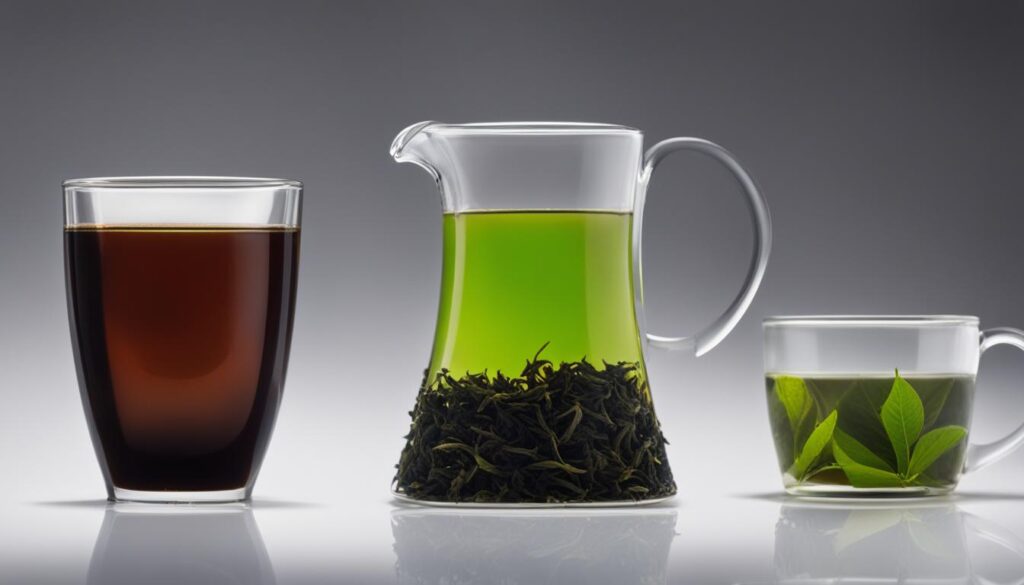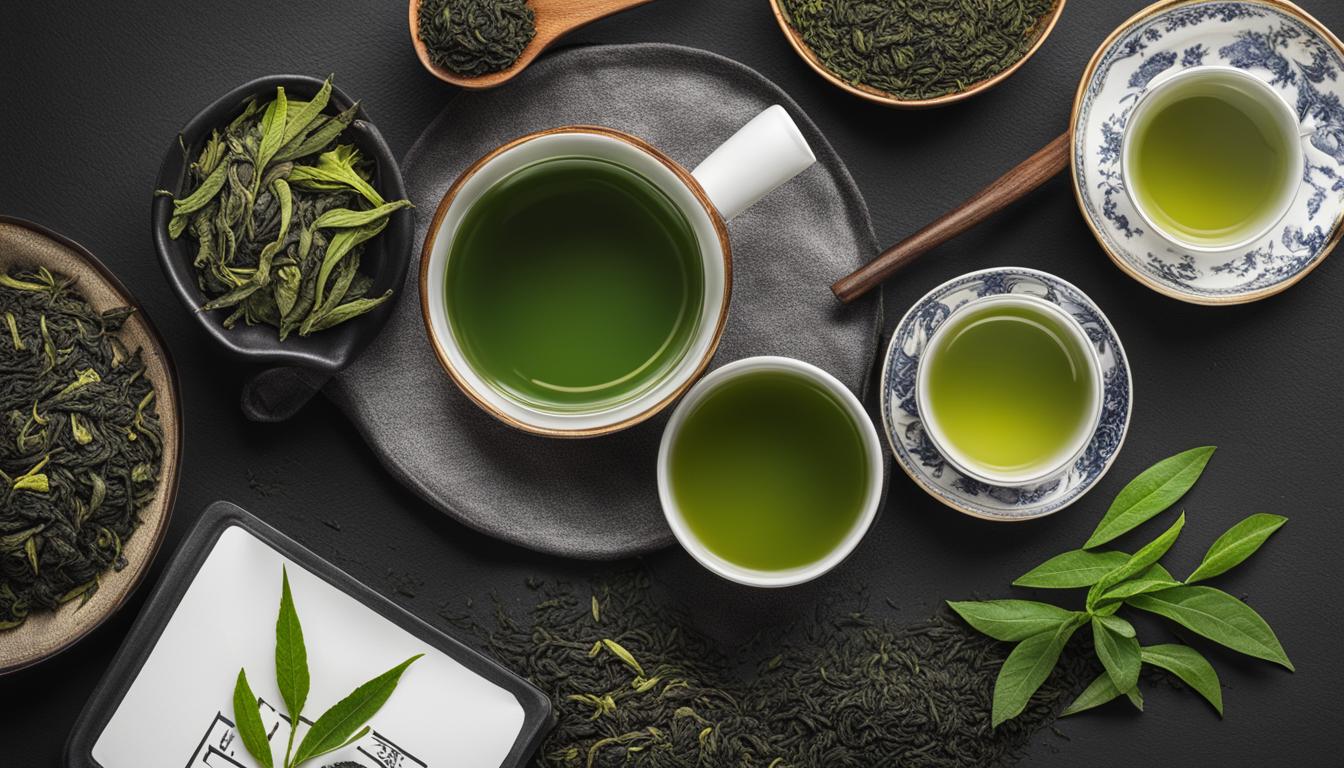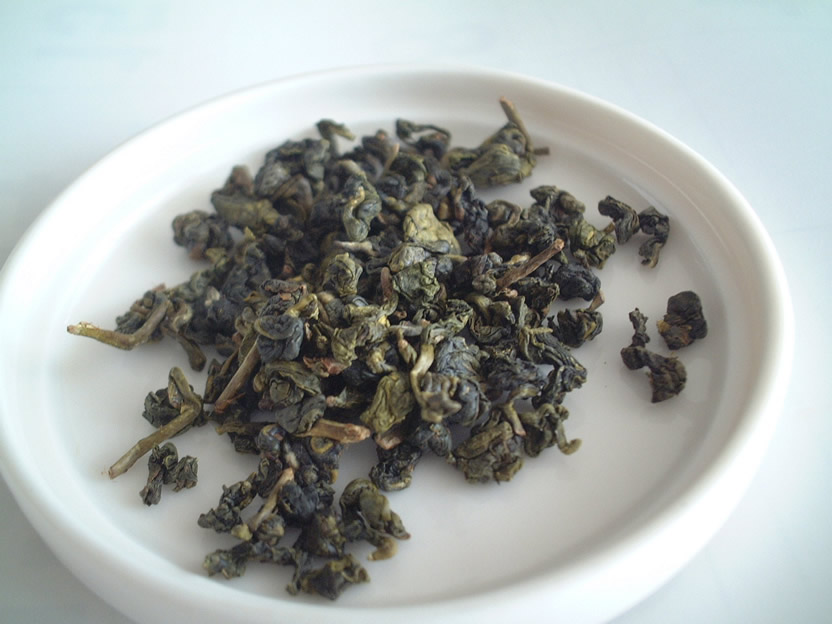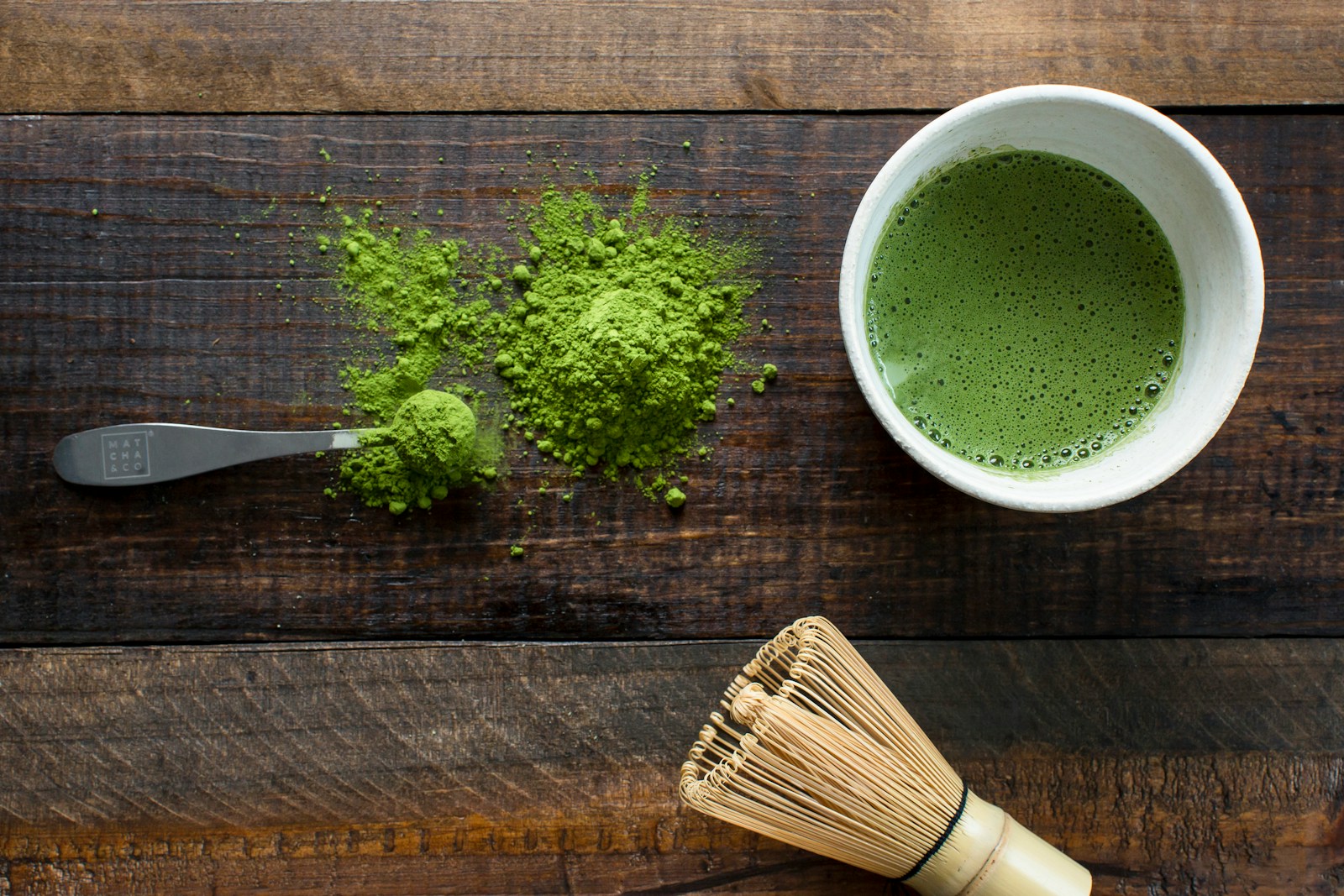Welcome to our comprehensive analysis of the benefits of black and green tea. Both of these teas are popular choices for health-conscious individuals, but which one is truly better for you? In this article, we will dive deep into the differences between black and green tea, exploring their health benefits, antioxidant content, effects on weight loss, heart health, skin, and brain health. By the end, you’ll have a better understanding of which tea may be the best fit for your needs.
Key Takeaways:
- Black tea and green tea come from the same plant, but undergo different processing methods, resulting in distinct flavors and colors.
- Black tea is fully oxidized, while green tea is minimally oxidized.
- Both teas are rich in antioxidants, but contain different types and levels of these beneficial compounds.
- Black tea has been linked to a reduction in the risk of depression, breast cancer, and type 2 diabetes, as well as potential benefits for skin and brain health.
- Green tea is associated with a reduced risk of depression, certain cancers, and heart disease, as well as potential weight loss benefits.
- Black tea generally contains more caffeine compared to green tea.
- While green tea may have slightly higher antioxidant levels, both teas can offer their own unique advantages.
The Differences Between Black and Green Tea
Black tea and green tea come from the same plant, Camellia sinensis, but they undergo different processing methods that give them distinct flavors and colors. Black tea is fully oxidized, resulting in a stronger flavor and darker color, while green tea is minimally oxidized, retaining its green color and a more delicate taste.
These processing differences also affect the chemical composition of the teas. Black tea contains higher levels of theaflavins and thearubigins, which are responsible for its robust flavor and potential health benefits. Green tea, on the other hand, is abundant in catechins, particularly epigallocatechin gallate (EGCG), a powerful antioxidant associated with various health benefits.
Another notable difference is the caffeine content. Black tea generally contains more caffeine than green tea, although the exact levels can vary. If you’re looking for a higher caffeine content, black tea may be the better choice. However, if you want a milder caffeine boost, green tea might be more suitable.
| Black Tea | Green Tea | |
|---|---|---|
| Flavor | Strong, robust | Delicate, grassy |
| Color | Dark | Green |
| Oxidation | Fully oxidized | Minimally oxidized |
| Antioxidants | Theaflavins, thearubigins | Catechins, particularly EGCG |
| Caffeine Content | Higher | Lower |
Ultimately, whether you prefer black tea or green tea depends on your personal taste preferences and desired health benefits. Both teas offer a range of antioxidants and potential health benefits, so incorporating either one into your daily routine can be a delicious and healthy choice.
Antioxidant Content: Black Tea vs Green Tea
When it comes to antioxidants, both black tea and green tea offer a wide range of health benefits. However, they differ in terms of the types and levels of antioxidants they contain.
Black tea is rich in theaflavins and thearubigins, which are formed during the oxidation process. These antioxidants have been shown to have anti-inflammatory and antimicrobial properties, as well as potential benefits for heart health and blood sugar regulation.
On the other hand, green tea is abundant in catechins, particularly epigallocatechin gallate (EGCG). Catechins are powerful antioxidants that have been linked to various health benefits, including reduced inflammation, improved heart health, and potential protection against certain types of cancer.
While both black and green tea contain antioxidants, the specific types and levels may vary. The choice between the two ultimately depends on your personal preferences and health goals.

The Antioxidant Content of Black Tea and Green Tea
| Antioxidant | Black Tea | Green Tea |
|---|---|---|
| Theaflavins | High | Low |
| Thearubigins | High | Low |
| Catechins | Low | High |
| Epigallocatechin Gallate (EGCG) | Low | High |
As seen in the table above, black tea is high in theaflavins and thearubigins, while green tea contains higher levels of catechins, including the potent antioxidant EGCG.
Overall, both black tea and green tea can be enjoyed as part of a healthy diet. While black tea may offer specific benefits for heart health and blood sugar regulation, green tea’s high catechin content, particularly EGCG, may provide stronger antioxidant properties. Ultimately, the choice between the two teas comes down to personal preference and individual health goals.
Health Benefits of Black Tea
Black tea is not only a delicious and comforting beverage, but it also offers a range of health benefits. Regularly incorporating black tea into your diet may have positive effects on various aspects of your well-being.
Firstly, black tea is rich in antioxidants, which help protect our cells from damage caused by free radicals. These antioxidants have been shown to reduce the risk of certain conditions such as depression, breast cancer, and type 2 diabetes. Additionally, black tea contains flavonoids that have been linked to improved heart health. Studies suggest that consuming black tea may help decrease LDL cholesterol levels, reducing the risk of cardiovascular diseases.
Furthermore, there is growing evidence to suggest that black tea may have beneficial effects on brain health. Some studies have shown that the compounds present in black tea, such as theaflavins and thearubigins, can enhance cognitive function and improve focus and attention.
| Health Benefits of Black Tea |
|---|
| Rich in antioxidants |
| Potential reduction in the risk of depression, breast cancer, and type 2 diabetes |
| Promotes cardiovascular health by reducing LDL cholesterol levels |
| Possible positive effects on brain health and cognitive function |
It’s important to note that while black tea offers these potential benefits, moderation is key. Excessive consumption of black tea, like any caffeinated beverage, may have adverse effects on health. It’s best to enjoy black tea as part of a balanced diet and lifestyle.
In the next section, we will explore the health benefits of green tea and compare it to black tea to help you make an informed decision about which tea suits your preferences and health goals.
Health Benefits of Green Tea
Green tea offers a plethora of health benefits, making it a popular choice for those seeking to improve their well-being. One of the key advantages of green tea is its potential to aid in weight loss. The catechins found in green tea have been shown to boost metabolism and increase fat oxidation, making it an excellent addition to a weight loss regimen. So, if you’re looking to shed a few pounds, incorporating green tea into your daily routine may be beneficial.
In addition to its weight loss properties, green tea is also known for its positive effects on heart health. Studies have suggested that the antioxidants in green tea, particularly EGCG, can help protect against cardiovascular diseases by reducing inflammation and improving blood vessel function. Drinking green tea regularly may contribute to a healthier heart and a lower risk of developing heart-related conditions.
To summarize, the health benefits of green tea are vast. From aiding in weight loss to promoting heart health, green tea is a versatile beverage that can improve various aspects of your well-being. So, why not make a cup of green tea a part of your daily routine and reap the many rewards it has to offer?
Caffeine Content: Black Tea vs Green Tea
When it comes to choosing between black tea and green tea, one important factor to consider is their caffeine content. While both teas provide a moderate caffeine boost, they differ in their levels. A cup of black tea typically contains around 47 mg of caffeine, whereas a cup of green tea has approximately 29.4 mg of caffeine. These levels are lower compared to coffee, making tea a popular choice for those seeking a milder stimulant.
For individuals who are sensitive to caffeine or looking to reduce their intake, green tea may be a preferred choice. Its lower caffeine content can help avoid the jitters or sleep disturbances that may come with consuming larger amounts of caffeine. Additionally, green tea’s caffeine content is often more tolerable for those with underlying health conditions, such as heart problems or anxiety.
It’s important to note that the effect of caffeine can vary depending on an individual’s tolerance and sensitivity. Some people may feel more energized and alert after consuming black tea, while others may experience a similar effect with green tea. It’s all about finding what works best for you and your body.

Comparing Caffeine Content: Black Tea vs Green Tea
| Tea Type | Caffeine Content per Cup (approx.) |
|---|---|
| Black Tea | 47 mg |
| Green Tea | 29.4 mg |
In summary, both black tea and green tea offer a moderate caffeine boost, but their levels differ. Black tea contains around 47 mg of caffeine per cup, while green tea has approximately 29.4 mg. Whether you prefer a stronger kick or a gentler effect, both teas can be enjoyed as part of a balanced lifestyle. Remember to consider your own sensitivity to caffeine and health goals when making your choice. So go ahead, savor your cup of tea and let its natural energy lift your spirits.
Which Tea is Healthier?
When it comes to determining which tea is healthier, there are a few factors to consider. Green tea and black tea both have their own unique health benefits, but green tea may have a slight edge overall.
Green tea is known for its high concentration of antioxidants, particularly epigallocatechin gallate (EGCG). These antioxidants have been shown to have powerful disease-fighting properties and can help protect against cellular damage and reduce inflammation. Research suggests that green tea may offer benefits such as a reduced risk of depression, improved mood, and protection against certain cancers and heart disease.
Black tea, on the other hand, is also rich in antioxidants, including theaflavins and thearubigins. While it may not have the same high levels of EGCG as green tea, black tea still offers its own set of advantages. Regularly consuming black tea has been associated with a reduced risk of conditions such as depression, breast cancer, and type 2 diabetes. It may also support skin health and cardiovascular health, including a reduction in LDL cholesterol levels. Some studies even suggest that black tea consumption may have positive effects on brain health and cognitive function.
Ultimately, the choice between black and green tea comes down to personal preference and individual health goals. Both teas can be part of a healthy diet and lifestyle and can offer their own unique advantages. So whether you prefer the bold flavor of black tea or the delicate taste of green tea, incorporating either into your routine can contribute to a healthy and balanced lifestyle.

The Benefits of Black and Green Tea: A Comparison
| Tea | Antioxidant Content | Health Benefits | Caffeine Content (per cup) |
|---|---|---|---|
| Black Tea | Rich in theaflavins and thearubigins | Reduced risk of depression, breast cancer, and type 2 diabetes. Potential benefits for skin, cardiovascular health, and brain health | Approximately 47 mg |
| Green Tea | Abundant in catechins, particularly EGCG | Reduced risk of depression, improved mood, and protection against certain cancers and heart disease. Potential aid in weight loss | Approximately 29.4 mg |
Conclusion
In conclusion, both black and green tea have their own set of health benefits and unique characteristics. Green tea may have a slight edge due to its higher antioxidant levels, but black tea also offers its own perks, such as its rich flavor and potential benefits for skin and brain health. The choice between black and green tea ultimately comes down to personal preference and individual health goals. Incorporating either tea into a balanced diet can contribute to a healthy lifestyle.
FAQ
Are black tea and green tea made from the same plant?
Yes, black tea and green tea both come from the same plant, Camellia sinensis.
What is the difference between black tea and green tea?
The main difference lies in their processing methods. Black tea is fully oxidized, resulting in a stronger flavor and darker color, while green tea is minimally oxidized, retaining its green color and a more delicate taste.
What antioxidants do black tea and green tea contain?
Black tea contains theaflavins and thearubigins, while green tea is rich in catechins, particularly epigallocatechin gallate (EGCG).
What are the health benefits of black tea?
Regularly drinking black tea has been linked to reduced risk of conditions such as depression, breast cancer, and type 2 diabetes. It may also support skin health, cardiovascular health, and brain health.
What are the health benefits of green tea?
Green tea has been associated with a reduced risk of depression, improved mood, and protection against certain cancers and heart disease. It may also aid in weight loss by boosting metabolism and fat oxidation.
How much caffeine is in black tea and green tea?
Black tea typically contains around 47 mg of caffeine per cup, while green tea has lower levels, with approximately 29.4 mg of caffeine per cup.
Which tea is healthier, black tea or green tea?
While both black and green tea offer numerous health benefits, green tea may slightly edge out black tea due to its higher levels of certain antioxidants, such as EGCG.





